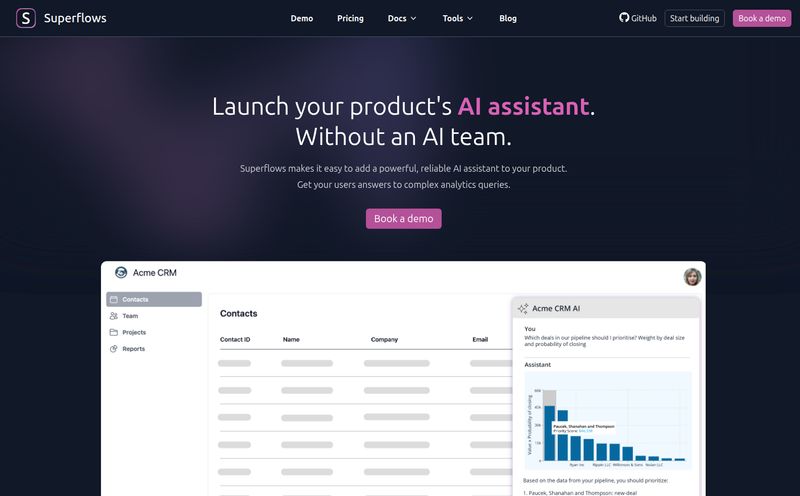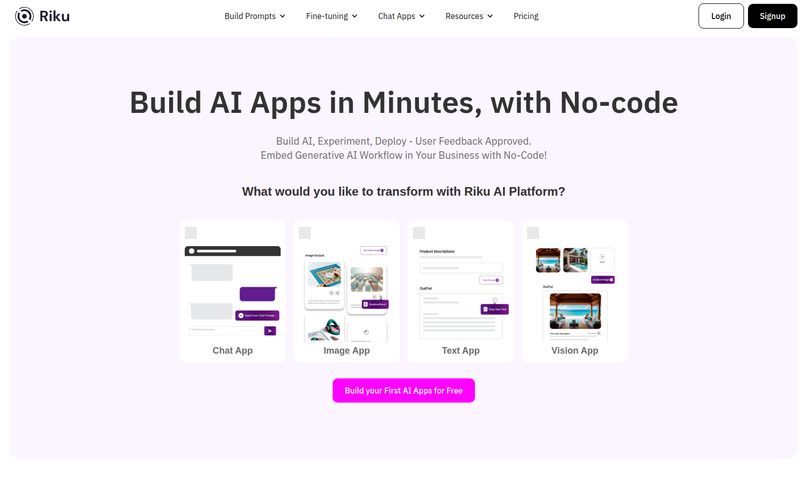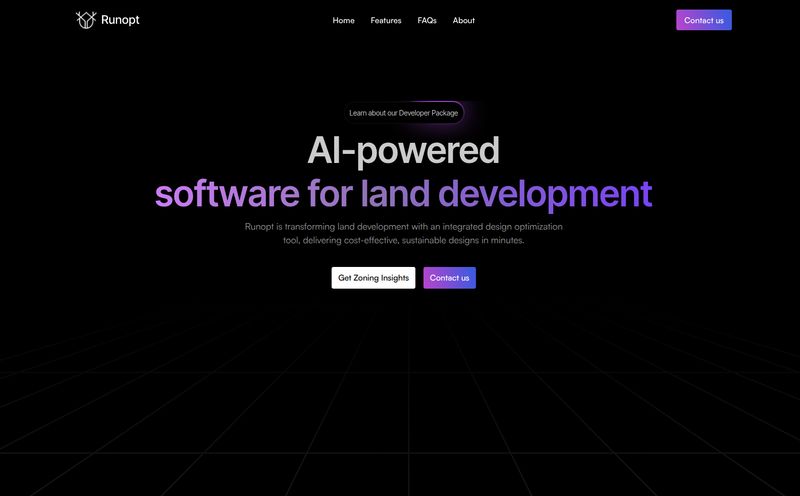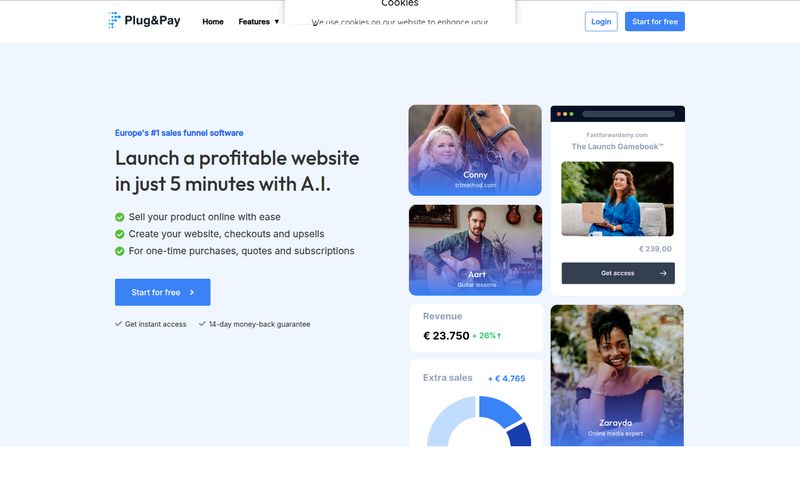I still get a cold sweat thinking about it. A few years back, a client needed a new landing page for a massive PPC campaign. The catch? They told me on a Friday afternoon, and the campaign was set to go live Monday morning. My weekend vanished into a blur of clunky page builders, developer arguments over a single pixel, and enough caffeine to power a small city. We got it done, but just barely. It wasn't pretty.
We've all been there, right? That frantic scramble to get a high-converting page up now. It's the classic bottleneck in marketing. The idea is great, the ad copy is sharp, but the landing page itself becomes a huge, time-sucking hurdle. So when I started hearing whispers about AI landing page generators, my ears perked up. Specifically, a tool called Pagen.
Could a robot really replace that weekend-destroying stress? Could it actually build something that not only looks good but also, you know, works for SEO and conversions? I had to find out.
So, What's the Big Deal with Pagen Anyway?
Let's get the basics out of the way. Pagen isn't just another drag-and-drop builder with some fancy templates. It positions itself as an AI landing page generator. You feed it an idea, a concept, a product description... and it supposedly spits out a fully-formed, content-rich landing page. Think of it less like a box of LEGOs and more like one of those 3D printers that builds a complete object from a blueprint.
The promise is huge: slash your development time, generate compelling copy on the fly, and do it all without writing a single line of code. For a busy SEO or a solopreneur wearing a dozen hats, that sounds less like a tool and more like a miracle. But I’m a professional skeptic, so I had to look under the hood.
Getting My Hands Dirty: The Pagen Experience
Signing up and getting started is, thankfully, a breeze. The interface is clean, which I appreciate. No one needs a cluttered dashboard when you're on a deadline. The core of the experience is giving the AI a prompt. This is where the magic (or lack thereof) happens.
The AI Content Wizard
I decided to test it with a fake product: "Artisan Cold Brew Coffee Concentrate for Busy Professionals." I fed it a few key points: organic, small-batch, saves time, delicious. What Pagen generated was... surprisingly good. The headlines were punchy, the body copy hit the right notes about convenience and quality. It was a solid B+ draft right out of the gate.
But here's the thing, and it's an important one: it's a draft. It's not your brand's voice. It's not my voice. It's a very well-written, generic marketing voice. This is where that human touch is non-negotiable. You absolutely need to go in and tweak the copy to match your personality. I've always said that AI is a fantastic co-pilot, but you still need to fly the plane. This holds true here. The AI gets you 80% of the way there in about 2% of the time, and that's a trade I'll take any day of the week.
Templates and Making It 'Yours'
Pagen comes loaded with a variety of templates that serve as the structural foundation. They're modern, clean, and follow established conversion-focused design principles. You can customize colors, fonts, and images to align with your brand. It’s pretty intuitive.
However, this is where one of the potential drawbacks pops up. If you're a designer or have super specific branding requirements, you might feel a bit boxed in. You can't just drag an element to a random spot on the page with pixel-perfect precision. It's a structured system. This is a classic speed-vs-control tradeoff. For 90% of landing page needs—a lead magnet, a webinar signup, a product feature—the customization is more than enough. For that 10% that requires a completely bespoke, avant-garde design, you might still need to call your designer.

Visit Pagen
The Million-Dollar Question: Is It Actually SEO-Friendly?
A pretty page that Google can't find is just an expensive work of art. As an SEO, this was my biggest concern. The term "AI builder" can sometimes be a red flag for bloated code and slow load times. Here's my breakdown of Pagen's SEO chops.
- Mobile Responsiveness: This is a big win. The pages Pagen generates are inherently mobile-responsive. In 2024, if your site isn't perfect on mobile, you might as well be invisible. Google's mobile-first indexing isn't a suggestion, it's the law of the land. Pagen gets a solid checkmark here.
- On-Page Elements: The tool gives you access to the stuff that matters: title tags, meta descriptions, alt text for images, and proper heading structures (H1, H2, etc.). It seems to build pages with a logical structure, which is great for crawlers.
- Page Speed: This is harder to judge without running a dozen tests on live pages. Generally, template-based systems like this can be quite lean since they don't have a ton of plugin-induced bloat like a self-hosted WordPress site might. This is a tentative plus, but as always, you should run your final page through PageSpeed Insights.
So yes, it seems to be built with SEO in mind. It's not going to automatically rank you #1, obviously—content and backlinks are still king—but it builds a foundation that won't actively work against your SEO efforts. And frankly, that's a relief.
Who Is This For? And Who Should Stick to the Old Ways?
I see a few clear winners for a tool like Pagen:
- Solopreneurs & Small Businesses: If you're the CEO, CMO, and janitor, your time is gold. Pagen can get a professional-looking page live in an hour, not a week.
- Marketers & Agencies: Need to validate an idea quickly? Launching a dozen small campaigns for different clients? This is a rapid-prototyping machine. You can test offers and angles without a huge upfront investment in design and dev time.
- PPC & Social Media Advertisers: For campaigns that need dedicated, hyper-specific landing pages, Pagen is a dream. You can spin up variants for A/B testing in a snap.
On the flip side, who might want to pass? Probably large enterprises with very strict brand guidelines and established, complex design systems. Or anyone who needs deep integrations with obscure, proprietary software. But for the vast majority of us in the marketing trenches, the tool is incredibly compelling.
The Good, The Bad, and The AI
Let's boil it down. What I loved was the sheer speed and the user-friendly nature. It truly is a no-code solution. The AI content generator is a fantastic brainstorming partner, and the fact that it's SEO-friendly and mobile-responsive out of teh box is a huge plus.
What gave me pause? The potential for limited customization could be an issue for design perfectionists. And you have to be mindful with your prompts for the AI; generic inputs will give you generic outputs. Garbage in, garbage out, as they say. It still requires a strategic human mind to guide it.
| What I Liked | What to Keep in Mind |
|---|---|
| Insanely fast page creation | Customization has its limits |
| Genuinely requires no coding skills | AI content needs a human touch |
| Solid SEO and mobile-first foundation | Effectiveness depends on your input keywords |
| Great for rapid testing and MVPs | Not a replacement for a full-blown, complex website |
What About the Price Tag?
Here's the million-dollar question I couldn't find a direct answer to. As of my review, Pagen's pricing wasn't prominently displayed on their main site. This isn't uncommon for new tools in beta or those refining their packages. My guess is we'll see a tiered subscription model, maybe with a free plan for one or two pages and paid tiers for more features and pages. For the most current information, your best bet is to head directly to the Pagen website.
Final Verdict: Is Pagen a Game Changer?
I went in skeptical, and I'm coming out... impressed. Pagen isn't going to put talented web designers and copywriters out of a job. Let's be clear about that. But it is going to change their job. It automates the tedious, time-consuming parts of the process, freeing up humans to focus on the high-level stuff: strategy, branding, and creative thinking.
It's not a silver bullet, but it's a seriously powerful weapon to have in your marketing arsenal. It turns landing page creation from a days-long chore into an hours-long creative session. And it completely eliminates the kind of weekend-destroying emergencies I used to dread. For me, that alone is worth its weight in gold.
Frequently Asked Questions
- Do I need to know how to code to use Pagen?
- Absolutely not. That's its main appeal. It’s a completely no-code platform. If you can write an email, you can build a page with Pagen.
- How good is the AI-generated content really?
- It's surprisingly effective for a first draft. It's great at creating a structure and hitting key marketing points. However, you'll always want to review and edit it to inject your own brand voice and unique selling propositions.
- Is Pagen better than hiring a web designer?
- It's different. For speed, cost-effectiveness, and simple, conversion-focused pages, Pagen is fantastic. For a highly complex, unique, or brand-defining web presence, a skilled human designer is still invaluable. Pagen is a tool for marketers, not necessarily a replacement for designers.
- Can I use my own domain with Pagen?
- While I couldn't test this feature directly, most SaaS page builders of this type offer custom domain mapping on their paid plans. It's a standard feature, and I would be very surprised if Pagen didn't offer it.
- What about site speed and Core Web Vitals?
- Because it's a closed system (not open-source like WordPress), Pagen has more control over its code output. This generally leads to better performance and speed, but you should always test your final page with tools like Google PageSpeed Insights to be sure.
- Is there a free trial for Pagen?
- This often changes with new software. The best way to find out is to visit their website directly. Many similar tools offer a free trial or a freemium model so potential users can test the platform's capabilities.
References and Sources
- Pagen Official Website
- Google's Guide to Mobile-First Indexing
- HubSpot's Overview of AI in Marketing



